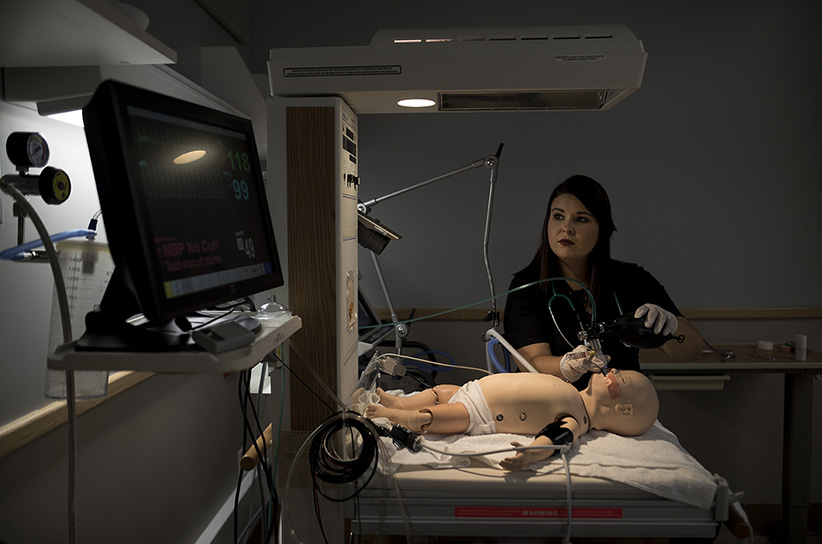NBCC respiratory therapy student relentless in the face of illness
After years spent battling severe allergies and asthma, a Saint John student vows to save lives as a respiratory therapist to make up for the one her sister lost
Dedication to learning: Jazmin Chase won a key student leadership award after just one year of study
Share

During the first six weeks of Jazmin Chase’s life, she was developing as a normal baby should. But then her health began to deteriorate. Before her first birthday, she was diagnosed with life-threatening allergies to dairy, eggs, peanuts, tree nuts and latex. Touching any of them could kill her, and on top of it all, she also had severe asthma. She spent the first five years of her life in and out of hospitals; doctors once told her she would never live to see her high school graduation. “I never really dreamed much more past the next day,” says the 23-year-old.
By the time she was 18, she was taking 18 different medications, including puffers, blood-pressure pills and antibiotics. There were also steroids, and because of their side effects, she weighed 270 lb. She spent the last few months of her Grade 12 year being home-schooled because, along with feeling chronically tired and unable to focus, her immune system was weak. A cold could easily have turned into double pneumonia.
After graduation, despite still being very sick, Chase left her hometown of St. George, N.B., to study nursing at l’Université de Moncton. “I ended up in the hospital—and the sickest I had ever been—my first month there.” She persevered, but during that first semester she went home for a visit and tragedy hit.
READ: New Brunswick Community College | Fredericton, N.B. | Founded 1973
Her 13-year-old sister, Ashton, woke up in the middle of the night and walked into the living room where her mom was watching TV. The teenager was having a hard time breathing, and eventually lost consciousness. Her mom called 911 while her dad ran to the house of a neighbour who was a registered nurse. Chase performed CPR until the neighbour took over, but they couldn’t save her. “My sister died on my living room floor,” she says.
Ashton was healthy, had no known allergies, and had been tested many times. Still, she died from an anaphylactic reaction, the cause of which is still unknown. Six months after her sister’s death, on the recommendation of her Saint John respirologist, Chase travelled to Hamilton, to the Firestone Clinic at St. Joseph’s Healthcare. There she had bronchial thermoplasty, a relatively new treatment that involves putting a catheter with electrodes into the airways and applying heat to the built-up muscle tissue in an effort to break it down and reduce its size, decreasing asthma attacks. It involved three separate procedures, and resulted in bruised vocal cords and two collapsed lungs. “I questioned many times if I thought it was worth it,” she says. Through the procedures, Chase spent a lot of time with respiratory therapists—specialized health care practitioners who focus on the lungs and airway management. She says there was one in particular who stayed with her through each procedure. “I loved how much knowledge she had on the respiratory system and how much care she had for someone she didn’t know.” That’s when Chase decided what she wanted to do with her life.
She applied to the respiratory therapy program at the New Brunswick Community College in Saint John, where she was chosen among hundreds for one of only 18 spots. Students in the three-year program spend half their time in the classroom at Gerald S. Merrithew Allied Health Education Centre, a complex that houses numerous NBCC health programs like practical nursing and radiation therapy, and half in a clinical setting.
After the thermoplasty, Chase’s health improved so much that she had fewer asthma attacks, fewer ER visits, and started to go for walks outside. Eventually she started running, and lost over 100 lb. At NBCC, Chase was able to resume full-time studies and really thrived. The coordinating instructor in the respiratory therapy program, Tammie Fournier, was especially impressed with Chase’s dedication, her kindness, and commitment to battling her medical conditions. Fournier nominated Chase for the NBCC Excellence Award in Student Leadership, open to students in all years, but typically given to a second- or third-year student. “When I received the blank nomination form, Jaz’s name came to mind,” says Fournier. Despite being in first year, Chase won the award, along with $500.
According to Fournier, respiratory therapists work with “the sickest people” in intensive-care units, asthma clinics, private home care and emergency rooms. After graduating in 2018, Chase wants to work in a neonatal intensive-care unit in a developing country like Ethiopia or Kenya. She travels with two Epipens and two inhalers, and is determined not to let her health prevent her from travelling.
Chase says her sister’s death motivated her to do everything she possibly could in life. She became a volunteer firefighter (though she only responds to medical or search-and-rescue calls), signed up for a mission trip to Belize, and even tried skydiving. In the end, there is one motivator that pushes her on. “I couldn’t save my sister’s life,” she says, “but I really hope I can save other peoples’ lives.”
[widgets_on_pages id=”Education”]